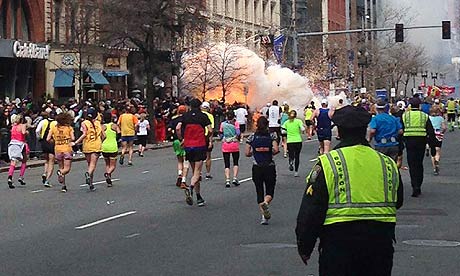September 11, Atlanta Olympics and more saw authorities and the media making mistakes, often to great human cost

Just 24 hours after the Boston Marathon bomb attack, there is intense media interest in the identity of possible "persons of interest" or suspects. In the immediate aftermath of the explosions, some news organisations continued to report that a Saudi man was under police guard – even after investigators had explicitly denied that anybody had been arrested. On Tuesday, it emerged that the man had been questioned as a witness, not a suspect.
As the FBI and police begin sifting through what they have described as a variety of leads, it is inevitable that they will look at some individuals or groups who turn out to have had no involvement. Previous major investigations provide cautionary tales about the dangers of the investigators or the media rushing to judgment.
Here are some examples of cases in which false leads, a fixation on particular individuals or groups and anonymous leaks have ruined lives and hampered the hunt for the real culprits.
9/11
Lotfi Raissi was the first person arrested over the September 11 terror attacks in New York and Washington.
The Algerian-born airline pilot was arrested at his home in Berkshire, England, 10 days after the attacks. He was held for five months, at Belmarsh high-security prison, and told he would be charged with conspiracy and murder in the US, where he would face the death penalty.
His arrest followed an extradition request by the FBI. In court, while he awaited extradition to the US on a holding charge, Raissi was dramatically described by British lawyers representing the US as one of the lead instructors of the four hijackers in the 2001 attacks. Officials later backed away from this assertion. In 2002, a British judge threw out the extradition case, ruling that Raissi should be granted bail because the US government failed to provide evidence against him.
Raissi said his imprisonment and implication in the worst terrorist attack on US soil in its history had taken its toll on his marriage, his health and his career. He battled for almost a decade to clear his name and for an apology. In 2008, in a judgment that exonerated him, three court of appeal judges condemned the Metropolitan police and the Crown Prosecution Service for abusing the court process, presenting false allegations and not disclosing evidence.
In April, 2010, Raissi was finally exonerated by the British government of all allegations of terrorism and told he would be eligible for compensation.
Atlanta Olympics
Richard Jewell, a security guard, was initially hailed as a hero, for alerting police to a suspicious backpack containing a pipe bomb during the 1996 summer Olympics in Atlanta, and for moving people out of harm's way before it exploded, killing one woman and injuring 111 people.
Three days after the Centennial Olympic Park bombing, the Atlanta Journal-Constitution, quoting FBI sources, described Jewell as the "focus" of the investigation. He was portrayed by other media outlets as a loser and a wannabe law enforcement official who planted the bomb in order to he seen as a hero afterwards.
Jewell was never arrested or charged, although he was questioned and was the subject of a search warrant. In October 1996, following months of intense scrutiny, the Justice Department cleared him. In 1997, US attorney general Janet Reno expressed regret over the leak regarding Jewell and said: "I think we owe him an apology."
The bomber turned out to be Eric Robert Rudolph, 36, an anti-government activist who planted three other bombs in Atlanta and in Birmingham Alabama, killing and maiming people including a police officer and a nurse. Rudolph was caught after spending five years hiding out in the mountains of western North Carolina. He pleaded guilty to all four bombings in 2005 and is serving life in prison.
In 2006, Jewell told the Associated Press that Rudolph's conviction had helped clear his name, but he believed that some people still remembered him as a suspect. He died in August 2007, from complications due to diabetes.
Jewell sued several news organisations, including CNN, NBC and the New York Post. In January last year a Georgia supreme court judge upheld a previous ruling dismissing a lawsuit brought by Jewell's family. The court found that the newspaper had accurately reported that he was a key suspect in an ongoing investigation.
The Washington sniper
The investigation into the "Beltway" sniper attacks in Washington, Maryland and Virginia in October 2002 was hampered by an initial belief that a single white man with assumed military experience, travelling in a white van or truck, was responsible.
Police later discovered that the car driven by the suspect, a blue Chevy Caprice, had come up several times near shooting locations in several states but had not been stopped, because law-enforcement computer networks were focused exclusively on a white van.
The shooting spree, which left 10 people dead, was later found to have been carried out by John Allen Muhammad and Lee Boyd Malvo, an accomplice who was 17 at the time. Both men were black. Muhammad was killed by lethal injection in November 2009; Malvo is serving a life sentence in prison. The pair were also suspected of shootings in several other states, including a killing in Louisiana and one in Alabama.
Oslo
In July 2011, when a bomb exploded in a building in central Oslo at the same time as a gunman opened fire on children at an island camp, news reports were quick to link the attacks to al-Qaida and militant Islamists. But it emerged that the mass killer was a blond Norwegian, Anders Behring Breivik.
Breivik was convicted of terrorism and pre-meditated murder, after killing 77 people, and sentenced to 21 years in prison. He pleaded guilty and said the attacks were needed to prevent the "Islamisation" of Norway.
